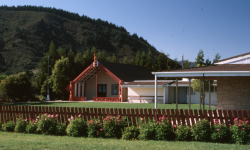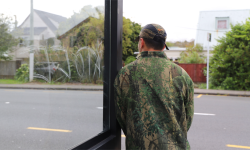[{"id":2660,"order":0,"imagePath":"https://admin.ezystream.com/static/images/article/ca9fc4ff-94e0-4fed-b161-906cd22edde4.png","type":"image","content":"https://admin.ezystream.com/static/images/article/ca9fc4ff-94e0-4fed-b161-906cd22edde4.png"},{"id":2661,"order":1,"contentText":"Many of our Baptist churches are experiencing a declining number of attendees at Sunday services, and a significant reduction in the number of people being baptised. Sadly, this is not just a Baptist phenomenon, but rather evidence of the pervasive underlying predicament of Western churches. Rick Pierce explains why this may not be all bad news.
A poignant moment from the first evening of the 2010 Baptist Assembly (now Hui), held at Otumoetai Baptist Church, is etched firmly in my mind. Rodney McCann, then National Leader, urged those gathered to voice aloud, u201cWe are in decline.u201d If, at that point, Rodney was addressing the elephant in the room, today the same message is broadcast by a flashing neon sign.
The church in the West is experiencing a cultural displacement, from the centre of society towards the margins, as evidenced by the recent McCrindle Report Faith and Belief in New Zealand. While this seemingly paints a negative outlook, we can conversely view this as a key transition time through disorientation to new orientation. It is a time of great opportunity and potential, as new forms and structures emerge to facilitate the churchesu2019 embodied life of the gospel and its missional role in living out and proclaiming the gospel.
Cultural displacement
Such a time of disorientation is an invitation to ask the hard questions about our identity and our calling: What does it mean today to be people in a covenantal relationship with our God and with one another? How do we renew our calling as people of mission in a very different (secular) context?
Perhaps it begins with a realisation and acceptance of what has transpired. In many respects, we can identify with the Kingdom of Judah in Old Testament times. Life in Jerusalem, situated around the temple, changed dramatically as many of the Jews were taken into Babylonian exile. As the Jews experienced the anguish, alienation and hopelessness of being strangers in a strange land, it became a pivotal time in their nationu2019s history and in their relationship with God. Questions were asked: Where is God in all of this? Has God abandoned us?
While we havenu2019t been taken into exile in another country, we may have voiced similar questions as we try to make sense of our cultural displacement in a 21st century Western context.
Making shalom visible
An important part of our journey may involve us grieving: recognising any sense of loss we are feeling, as society has radically changed around us; letting go of what has been; and grasping a renewed vision of the future. Hope comes through knowledge that God is still with us, as indeed he was for the Jews. Through the prophet Ezekiel, God reassured the Jews of his continued presence with them, even in exile. While Godu2019s people were displaced from the temple, from Jerusalem and from the Promised Landu2014those aspects of life that signified Godu2019s power and presenceu2014the vision of Ezekiel 1 shows God coming to them and being present with them in Babylon. God later describes himself as u201ca sanctuary for them in the countries where they have goneu201d (Ezekiel 11:16 NIV).
Even in exile, he was still God, the Jews were still his people and he was still in control. With this revelation, the Jews needed to rediscover what it meant for them to be the people of God living in the pagan Babylonian Empire. That awareness came through the prophet Jeremiah, as God instructed his people to u201cseek the peace [shalom] and prosperity of the city to which I have carried you into exile. Pray to the Lord for it, because if it prospers, you too will prosperu201d (Jeremiah 29:7 NIV).
Cornelius Plantinga Jr describes shalom as, u201cthe webbing together of God, humans, and all creation in justice, fulfillment, and delight... In the Bible shalom means universal flourishing, wholeness and delight.u201d1 Such a vision of what God desires has not changed. Shalom will ultimately become a fulfilled reality when Christ returns, bringing all things together under his reign. Until then, the church is called to help make shalom visible, something we can only do through grace as we participate in the life of our triune God.
A re-envisioned discipleship
In our 21st Century u2018Babylonu2019, where much of society seems to be unravelling itself from anything to do with God, discipleship requires a re-envisioning. We need to regain a shared vision of what it means for us to be the people of God, to be people who, together u2018in Christu2019, embody his life and make visible his shalom.
This does not involve the church assimilating into secular culture or withdrawing from the world. Rather it means engaging the day-to-day realities of life as we live together in Christ, sharing in the life of God.
Such a life, by the very nature of God, becomes distinctive from the culture, ironically pushing us further to the margins of society. However, it is from here that the church regains its prophetic voice, demonstrating by its life together a revelation of divine lifeu2014the grace, love and shalom of God.
Living out what we believe
So what does it look like for the [Baptist] people of God to share life together in Christ, evidencing this shalom? How are we providing evidence of the life of God through embodying his life in community?
There is no silver bullet on the way forward but itu2019s here we realise our Baptist ecclesiology is ideally suited to the cultural times we are experiencing. Each local church stands under the direct rule of the risen Christ, experiencing its life through being in Christ. Each local church determines who God is calling them to be and what he is calling them to do, in their particular community. It is built up through each member being empowered to contribute his or her God-given gifts. Each local church is to become a dynamic, Spirit-inspired, self-giving, self-denying, self-emptying, authentic, loving and grace-filled community that makes visible the life of God they are sharing in.
Such evidence of Godu2019s life is obviously more than a group of people gathering at a set time, at a given place, for corporate worship on a Sunday. In saying this, Iu2019m not casting doubt on the importance of the gathered community in which Christ is present, but rather what we have limited it to. We need to recognise that each time two or three gather around the Word and in Spirit, the Spirit freshly constitutes the church. Christ is present; Christ is speaking.
Our role as Godu2019s people is to discern the mind of Christ in what needs to become a more participatory u2018conversationu2019 in which all those present find the freedom to contribute (providing opportunities to hear the voice of those on the margins of our churches). Itu2019s therefore not our gathering, but how we arrange our gatherings (of at least two or three people) to facilitate the life of the church, thatu2019s key in helping us flourish in our life together.
How are we organising leadership through our faith communities to facilitate our sharing in the life of Christ? How are we structuring our faith communities so small groups are relationally connected to larger mid-size groups, which in turn are relationally connected to larger groups still (representing one of our 240 or so churches throughout Aoteoroa, covenanted together as the New Zealand Baptist family). How are we as churches connected to other churches in our locality, whether Baptist or those of other denominations? The formation of concentric circles of relationship serve to demonstrate the life of God in which we all participate as his people, thereby making that life visible and known to others.
The life of Christ, present in all sized communities, remains the source of a churchu2019s life. As we experience this life, fulfilling the many u2018one anotheru2019 instructions of life together in the New Testament, and as we embody Christu2019s life in who weu2019re becoming as a church, weu2019ll discover that discipleship sparks creative, innovative and Spiritu2011inspired mission initiatives to seek the shalom of our local communities. For example, it may be through a social enterprise initiative where business becomes a tool for mission; or serving the needs of those with mental illness; or reaching across ethnicities and helping those new to the country with their integration. Again, we recognise our Baptist ecclesiology provides an ideal form for each church to facilitate these new, unique and personal forms of community life under the rule of Christ.
If we discern the times, recognising the presence and rule of Christ in our gatherings and as our source of life, weu2019ll become churches that live out what we believe. Perhaps one day a future National Leader will then be able to stand at our annual Hui and have those gathered boldly proclaim, u201cWeu2019re embodying the gospel; weu2019re growing like a mustard seed; weu2019re making the life of God visible. All glory to the grace and love of God!u201d Then again, he or she wonu2019t have to, because it will already be proclaimed clearly by a flashing neon sign!
Story: Rick Pierce
Rick is Pastor, Spiritual Formation, at Windsor Park Baptist Church. Rick and the pastors involved in the PressingOn initiative are in the process of designing a 33-week teaching series, Faith and Life in New Zealand 2019. Itu2019s a journey aimed at re-envisioning their church communities for a life of discipleship in our 21st century Western context. To find out more about PressingOn visit pressingon.org.nz.
Reference:
- C Plantinga Jr, Not the Way Itu2019s Supposed to Be: A Breviary of Sin (Grand Rapids: Eerdmans, 1995), 10.
Scripture:
Unless otherwise specified, Scripture quotations are from New Revised Standard Version Bible, copyright u00a91989 National Council of the Churches of Christ in the United States of America. Used by permission. All rights reserved.
Scripture quotations marked (NIV) are taken from the Holy Bible, New International Versionu00ae, NIVu00ae. Copyright u00a9 1973, 1978, 1984, 2011 by Biblica, Inc.u2122 Used by permission of Zondervan. All rights reserved worldwide. www.zondervan.com. The u201cNIVu201d and u201cNew International Versionu201d are trademarks registered in the United States Patent and Trademark Office by Biblica, Inc.u2122
","type":"text"}] Re-envisioning discipleship
Articles
Growing Disciples, Discipleship | Rick Pierce | 03 February 2019
- Syntax error, malformed JSON
Read More Articles
Register now for Hui ā Māori 2024: ‘no greater time to be unified’
A call for Baptist Māori to engage with the significant kōrero coming to Hui ā Māori 2024.
Reflections on the season of Matariki
Three Baptist Māori share what they’ll be doing to acknowledge this season.
Are our social support services making a difference?
Transactional or transformational support: what services should our local church aim for to empower our communities?


